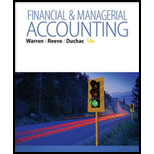
Financial & Managerial Accounting
13th Edition
ISBN: 9781285866307
Author: Carl Warren, James M. Reeve, Jonathan Duchac
Publisher: Cengage Learning
expand_more
expand_more
format_list_bulleted
Concept explainers
Question
Chapter 25, Problem 25.1BPR
1. (a)
To determine
Average
Average rate of return is a method that measures the average earnings of a particular business, as a percentage of the average investment. It is also known as accounting rate of return.
Calculation of Average rate of return:
The average rate of return for each project.
2.
To determine
To prepare: The report the merits of the two investments to the capital investment committee.
Expert Solution & Answer
Want to see the full answer?
Check out a sample textbook solution
Students have asked these similar questions
Can you solve this general accounting problem with appropriate steps and explanations?
If Sierra Manufacturing had their total liabilities increased by $8,400 and stockholders' equity decreased by $3,700 during a period of time. Then total assets must have changed by what amount and direction during that same period? help
Can you help me solve this financial accounting problem with the correct methodology?
Chapter 25 Solutions
Financial & Managerial Accounting
Ch. 25 - Prob. 1DQCh. 25 - Discuss the principal limitations of the cash...Ch. 25 - Prob. 3DQCh. 25 - Prob. 4DQCh. 25 - Prob. 5DQCh. 25 - Prob. 6DQCh. 25 - Prob. 7DQCh. 25 - Two projects have an identical net present value...Ch. 25 - Prob. 9DQCh. 25 - Prob. 10DQ
Ch. 25 - Prob. 11DQCh. 25 - Give an example of a qualitative factor that...Ch. 25 - Average rate of return Determine the average rate...Ch. 25 - Average rate of return Determine the average rate...Ch. 25 - Cash payback period A project has estimated annual...Ch. 25 - Prob. 25.2BPECh. 25 - Prob. 25.3APECh. 25 - Prob. 25.3BPECh. 25 - Internal rate of return A project is estimated to...Ch. 25 - Prob. 25.4BPECh. 25 - Prob. 25.5APECh. 25 - Prob. 25.5BPECh. 25 - Prob. 25.1EXCh. 25 - Average rate of returncost savings Midwest...Ch. 25 - Average rate of returnnew product Galactic Inc. is...Ch. 25 - Calculate cash flows Natures Way Inc. is planning...Ch. 25 - Prob. 25.5EXCh. 25 - Cash payback method Lily Products Company is...Ch. 25 - Prob. 25.7EXCh. 25 - Prob. 25.8EXCh. 25 - Prob. 25.9EXCh. 25 - Prob. 25.10EXCh. 25 - Net present value method for a service company...Ch. 25 - Present value index Dip N' Dunk Doughnuts has...Ch. 25 - Net present value method and present value index...Ch. 25 - Average rate of return, cash payback period, net...Ch. 25 - Cash payback period, net present value analysis,...Ch. 25 - Internal rate of return method The internal rate...Ch. 25 - Prob. 25.17EXCh. 25 - Internal rate of return methodtwo projects Munch N...Ch. 25 - Prob. 25.19EXCh. 25 - Prob. 25.20EXCh. 25 - Net present value unequal lives Bunker Hill Mining...Ch. 25 - Net present value unequal lives Daisys Creamery...Ch. 25 - Prob. 25.1APRCh. 25 - Cash payback period, net present value method, and...Ch. 25 - Prob. 25.3APRCh. 25 - Prob. 25.4APRCh. 25 - Prob. 25.5APRCh. 25 - Prob. 25.6APRCh. 25 - Prob. 25.1BPRCh. 25 - Cash payback period, net present value method, and...Ch. 25 - Prob. 25.3BPRCh. 25 - Net present value method, internal rate of return...Ch. 25 - Prob. 25.5BPRCh. 25 - Capital rationing decision for a service company...Ch. 25 - Ethics in Action Danielle Hastings was recently...Ch. 25 - Prob. 25.2CPCh. 25 - Prob. 25.3CPCh. 25 - Qualitative issues in investment analysis The...Ch. 25 - Prob. 25.5CP
Knowledge Booster
Learn more about
Need a deep-dive on the concept behind this application? Look no further. Learn more about this topic, accounting and related others by exploring similar questions and additional content below.Similar questions
- I am searching for a clear explanation of this financial accounting problem with valid methods.arrow_forwardA $5,000 bond issued in 2020 pays $275 in interest each year. What is the current yield on the bond if it can be purchased for $4,200?arrow_forwardPlease help me solve this financial accounting question using the right financial principles.arrow_forward
- I need assistance with this financial accounting question using appropriate principles.arrow_forwardPlease explain the correct approach for solving this general accounting question.arrow_forwardPlease explain the solution to this general accounting problem using the correct accounting principles.arrow_forward
- Camden Electronics applies manufacturing overhead on the basis of direct labor-hours. At the beginning of the most recent year, the company based its predetermined overhead rate on total estimated overhead of $95,000. Actual manufacturing overhead for the year amounted to $97,200, and actual direct labor-hours were 9,400. The company's predetermined overhead rate for the year was $10 per direct labor-hour. The applied manufacturing overhead for the year was closest to _.arrow_forwardMorgan Industries assigned $375,000 standard direct materials cost to its output for the current period. The direct materials variances included a $12,500 unfavorable price variance and a $8,200 favorable quantity variance. What is the actual total direct materials cost for the current period? Correct answerarrow_forwardPlease provide the correct answer to this financial accounting problem using accurate calculations.arrow_forward
arrow_back_ios
SEE MORE QUESTIONS
arrow_forward_ios
Recommended textbooks for you
 Managerial AccountingAccountingISBN:9781337912020Author:Carl Warren, Ph.d. Cma William B. TaylerPublisher:South-Western College PubPrinciples of Accounting Volume 2AccountingISBN:9781947172609Author:OpenStaxPublisher:OpenStax College
Managerial AccountingAccountingISBN:9781337912020Author:Carl Warren, Ph.d. Cma William B. TaylerPublisher:South-Western College PubPrinciples of Accounting Volume 2AccountingISBN:9781947172609Author:OpenStaxPublisher:OpenStax College Financial And Managerial AccountingAccountingISBN:9781337902663Author:WARREN, Carl S.Publisher:Cengage Learning,
Financial And Managerial AccountingAccountingISBN:9781337902663Author:WARREN, Carl S.Publisher:Cengage Learning, EBK CONTEMPORARY FINANCIAL MANAGEMENTFinanceISBN:9781337514835Author:MOYERPublisher:CENGAGE LEARNING - CONSIGNMENT
EBK CONTEMPORARY FINANCIAL MANAGEMENTFinanceISBN:9781337514835Author:MOYERPublisher:CENGAGE LEARNING - CONSIGNMENT Intermediate Financial Management (MindTap Course...FinanceISBN:9781337395083Author:Eugene F. Brigham, Phillip R. DavesPublisher:Cengage Learning
Intermediate Financial Management (MindTap Course...FinanceISBN:9781337395083Author:Eugene F. Brigham, Phillip R. DavesPublisher:Cengage Learning

Managerial Accounting
Accounting
ISBN:9781337912020
Author:Carl Warren, Ph.d. Cma William B. Tayler
Publisher:South-Western College Pub

Principles of Accounting Volume 2
Accounting
ISBN:9781947172609
Author:OpenStax
Publisher:OpenStax College

Financial And Managerial Accounting
Accounting
ISBN:9781337902663
Author:WARREN, Carl S.
Publisher:Cengage Learning,

EBK CONTEMPORARY FINANCIAL MANAGEMENT
Finance
ISBN:9781337514835
Author:MOYER
Publisher:CENGAGE LEARNING - CONSIGNMENT

Intermediate Financial Management (MindTap Course...
Finance
ISBN:9781337395083
Author:Eugene F. Brigham, Phillip R. Daves
Publisher:Cengage Learning
